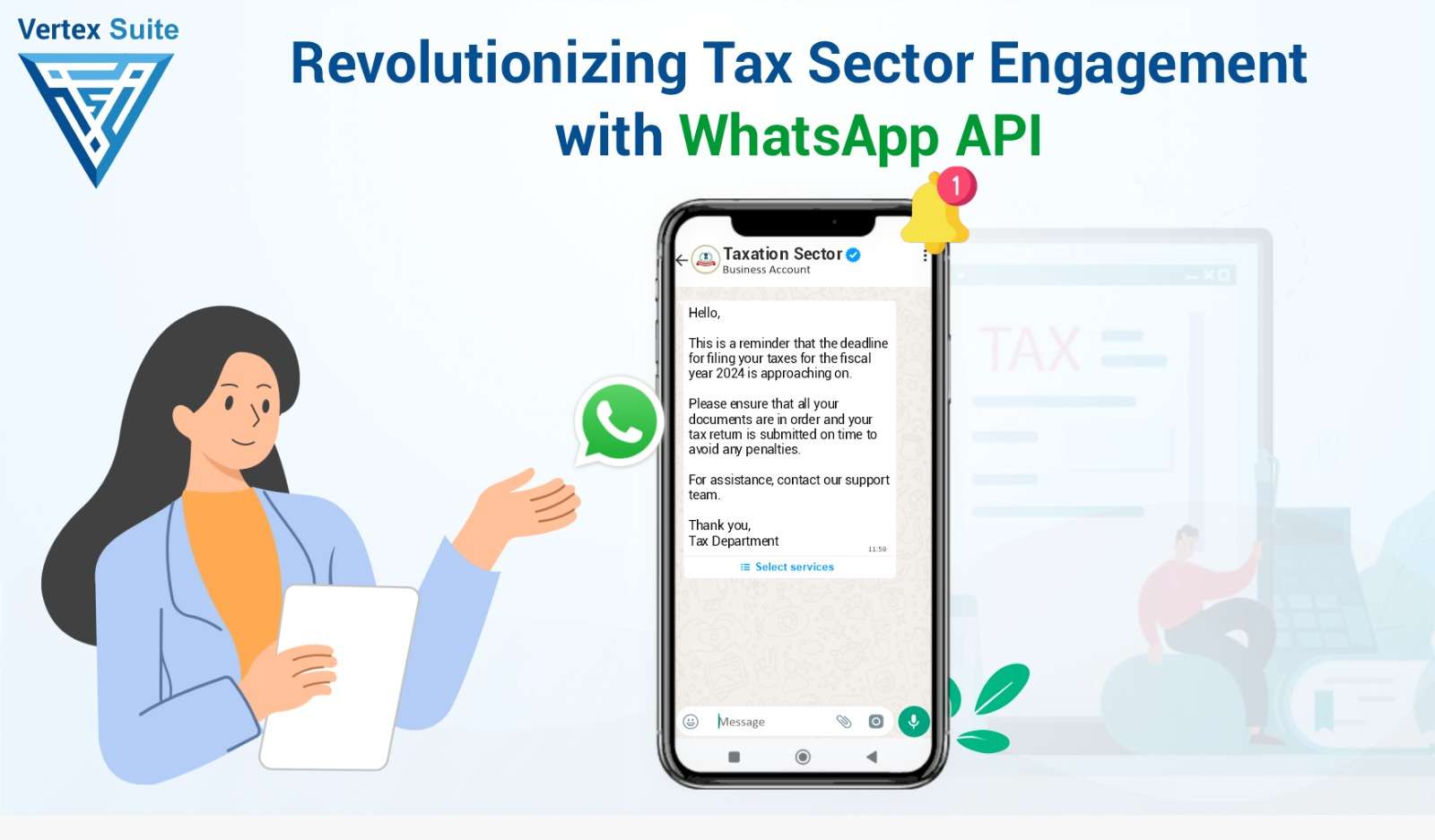The taxation sector plays a vital role in strengthening India's economy which includes various elements like Income Tax, Goods and Services Tax (GST) and a wide range of other state and central taxes on a single platform. Now to manage these taxes in a robust manner, effective communication is required between the government and taxpayers to ensure timely government and taxpayer compliance, payment and proper dissemination of information.
Now with the rapid adoption of digital communication tools, WhatsApp Business API has emerged as a powerful platform to enhance this interaction.
Now with the rapid adoption of tools to develop this communication system, WhatsApp Business API has emerged as a powerful platform to enhance this interaction. Through this blog, we will tell how WhatsApp Business API can revolutionize the taxation sector by improving taxpayer engagement, compliance and satisfaction.
1. Tax Filing Reminders and Payment Alerts
One of the biggest problems in the taxation sector is getting taxpayers to file and pay their returns on time. Missing deadlines can lead to penalties, interest charges and increased scrutiny from tax authorities. The taxation sector can play a key role in providing solutions to these challenges by providing timely and personalized tax filing reminders and payment alerts with the help of WhatsApp Business API.
Example Scenario:
Suppose you are a small business owner who manages many aspects of your business, from operations to customer service. It's easy for them to forget tax filing deadlines because they have so many responsibilities.
Using the WhatsApp Business API, the tax department can send a reminder to the business owner's WhatsApp account a week before the GST filing deadline. There can be a direct link to the GST portal where filing can be completed along with the exact date and amount due. As a result, business owners are assured they won't be penalized for not meeting their obligations.
Key Benefits:
Improved compliance: Periodic automated reminders reduce the chances of missing deadlines, thereby increasing the compliance rate thereby reducing penalties for taxpayers.
Enhanced Convenience: Providing a direct link to the filing portal via WhatsApp makes it easier for taxpayers to fulfil their obligations promptly.
Efficiency in Communication: The automated nature of WhatsApp reminders ensures that all taxpayers receive the required information without any delay, thereby improving the overall communication efficiency between the tax department and taxpayers.
2. GST Updates and Compliance Notifications
Goods and Services Tax (GST) is a dynamic area in the taxation space, with constant updates on rates, policies and compliance requirements. For businesses, it is important to stay up to date with these changes to maintain compliance and avoid penalties. WhatsApp API provides an effective channel to deliver updates and compliance notifications in real-time directly to the taxpayer.
Example Scenario:
Suppose a mid-sized manufacturing company needs to stay informed about GST rate changes for raw materials and finished goods. Using the WhatsApp Business API, the tax department can send notifications in real-time whenever there is a change in GST rates that affects the company. These notifications can include a brief description of the change, its effective date, and a link to a detailed document or official announcement for further reading. Additionally, the company can receive compliance alerts reminding them of upcoming GST return deadlines, discrepancies in their filing, or changes in compliance requirements.
Key Benefits:
Real-Time Updates: Taxpayers receive timely notifications about changes in GST rates and compliance requirements, helping them stay informed and compliant.
Improved Compliance: Regular reminders about compliance requirements reduce the risk of businesses unintentionally missing deadlines or failing to adhere to new regulations.
Guidance and Support: The WhatsApp platform can also be used to share informative content, such as how-to guides, FAQs, and tutorials, to help businesses understand and fulfill their GST obligations more efficiently.
3. Information on Tax Relief Schemes
Tax relief schemes are designed to provide financial benefits to eligible taxpayers, but they are often underutilized due to a lack of awareness or understanding. The WhatsApp Business API can be an effective tool for disseminating information about these schemes, ensuring that more taxpayers can benefit from the reliefs available to them.
Example Scenario:
Consider a salaried individual who is eligible for a new tax relief scheme introduced by the government for middle-income earners. The tax department can send a WhatsApp message to this individual, informing them about the scheme and explaining the eligibility criteria. The message could also include a link to a government portal where the individual can check their eligibility and apply for the relief. To further assist, the tax department could provide a step-by-step guide through WhatsApp, detailing the documents required, the application process, and important deadlines.
Key Benefits:
Increased Awareness: Direct communication via WhatsApp ensures that eligible taxpayers are informed about available tax relief schemes and can take advantage of them.
Simplified Process: Providing clear, step-by-step instructions simplifies the application process, encouraging more taxpayers to apply for relief.
Higher Participation: By making the information easily accessible, more taxpayers are likely to benefit from these schemes, leading to higher participation rates and increased taxpayer satisfaction.
4. Status Updates for Refunds and Assessments
One of the most common concerns among taxpayers is the status of their tax refunds and assessments. Traditionally, taxpayers have had to check portals regularly or contact the tax department for updates. The WhatsApp Business API can streamline this process by providing real-time status updates directly to taxpayers.
Example Scenario:
After filing their income tax return, a taxpayer is eager to know when they will receive their refund. Instead of repeatedly checking the government portal, the taxpayer receives periodic updates on WhatsApp about the status of their refund. These updates include when the refund is processed, when it is dispatched, and when it is expected to be credited to their bank account. If there are any issues, such as incorrect bank details, the taxpayer is notified immediately with instructions on how to rectify the problem. This transparent and proactive approach reduces the taxpayer’s anxiety and enhances trust in the tax system.
Key Benefits:
Transparency: Providing real-time status updates fosters greater transparency and builds trust between the tax department and taxpayers.
Reduced Anxiety: Timely notifications keep taxpayers informed, reducing the need for them to check the status constantly or contact the tax department for updates.
Improved Experience: By enhancing the communication process, taxpayers experience greater satisfaction with the services provided, leading to a more positive perception of the tax system.
Integrating WhatsApp Business API into the taxation sector has the potential to transform the way the government interacts with taxpayers. From sending timely tax filing reminders and payment alerts to providing real-time updates on GST changes and tax refunds, WhatsApp offers a user-friendly and efficient platform for managing tax-related communication. The personalized and direct nature of WhatsApp messages ensures that taxpayers receive the information they need when they need it, leading to higher compliance rates, reduced penalties, and enhanced taxpayer satisfaction.
By leveraging the wide reach and accessibility of WhatsApp, the government can make tax-related information more readily available, simplify complex processes, and ultimately foster a more positive relationship between the tax authorities and the citizens they serve. As the taxation sector continues to evolve, adopting innovative communication tools like WhatsApp Business API will be crucial in meeting the needs of a digitally connected and increasingly mobile population.


